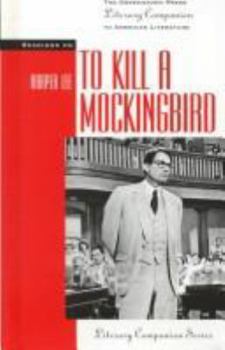To Kill a Mockingbird
Select Format
Select Condition 
Book Overview
Edited and abridged with a view towards the comprehension levels of young adults, these 14 contributions explore the literary techniques, social issues, and character development of the novel . The... This description may be from another edition of this product.
Format:Hardcover
Language:English
ISBN:1565105761
ISBN13:9781565105768
Release Date:January 1999
Publisher:Greenhaven Press
Length:144 Pages
Weight:0.70 lbs.
Dimensions:0.6" x 5.7" x 8.8"
Age Range:13 years and up
Grade Range:Grade 8
Customer Reviews
1 rating
Provocative essays on Harper Lee's great American novel
Published by Thriftbooks.com User , 22 years ago
I do not think of Harper Lee's "To Kill a Mockingbird" as the greatest novel in American literary history (Mark Twain's "Huckleberry Finn" and John Steinbeck's "The Grapes of Wrath" are the contenders for that honor), but it is my favorite American novel. Recently it has become the focus of civic reading programs, as it is now here in Duluth (obviously, it avoids the controversial language of Twain or the symbolic final image of Steinbeck). After reading the book this volume of "Readings on 'To Kill a Mockingbird'" will offer readers of Lee's novel some interesting perspectives.After a brief biography of Harper Lee, there are four main units to this volume. First, there is The Critical Reception to the novel, which includes contemporary reviews from "Time" and "Christian Century" as well as a consideration from a book looking at Pulitzer Prize novels, which consider it to be a better-than-average first novel although not without "fatal flaws" (e.g., no realistic characters with whom the reader can identify). Second, there is a look at the Literary Techniques in the novel, which consists of three essays all of which look at symbols: the mad dog, the mockingbird, and racism. Third, is a treatment of Social Issues in the novel, covering how it teaches moral values, raises issues about gender roles, shows the difference between legal codes and human perceptions of justice, and a controversy over having the novel censored by a Virginia school board in 1966. Fourth, the Character of Atticus Finch is debated in four essays, two of which argue he is a heroic figure and two which take the opposite position. The back of the book includes a look at the Characters and Plot of the novel, as well as a chronology of the author, her novel and the times in which they lived. For me the fourth section is the most interesting because it shows the importance of critical perspectives. Michael Asimov considers Atticus to be a heroic figure, worthy of emulation by real-life attorneys, because of his defense of a doomed client while Thomas L. Schaffer focuses on Atticus Finch's dedication to truth in the face of adversity which makes him not only heroic but noble. Then John Jay Osborn, Jr. (author of "The Paper Chase") argues Finch is neither heroic nor a good role model for attorneys because he values his own principles more than he does the life and freedom of his client, while Monroe Freedom makes the case Finch accepted the racism in his community and did nothing to stand up against it. This reflects the value of this collection, that it clearly sets up two sides and gives all readers something to think about. Of course, this is all predicated on the fact that you have actually read the book and not simply watched the movie. Other titles in the Literary Companion Series focus on specific American Authors such as Maya Angelou, Arthur Miller and Walt Whitman as well as key works in American Literature such as "The Catcher in the Rye," "The Great Gatsby,"





